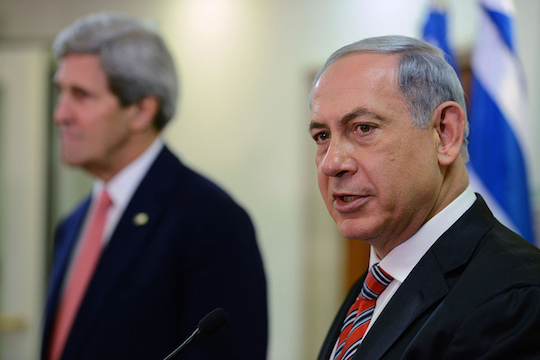The Israeli government is pulling out all of its usual tricks. It is clear from Netanyahu’s demands that a nuclear deal include recognition of Israel’s right to exist and that it address Tehran’s support for Hezbollah and Iran, that the Israeli prime minister will never accept any deal with the current Iranian regime — much like his approach to the two-state solution.

One might be tempted to think that disagreements about technicalities and tactics aside, Israel and the United States are on the same page about the overarching goal of nuclear negotiations with Iran. They are not.
The goal of the United States and the other P5+1 states is simple: reach an agreement in which Iran willingly gives up any nuclear ambitions and implements tangible mechanisms to reassure the world it is doing so. In other words, to stop Iran from getting the bomb.
Israel, or at least Benjamin Netanyahu and those he has enlisted to his cause over the past 20 years, wants something entirely different. Netanyahu wants Tehran to change its entire regional strategic thinking — to throw its allies to the wayside and to embrace its enemies. He wants regime change.
That gaping divergence of goals and worldviews has been on full display in recent days as both the Netanyahu and Obama administrations went on the offensive to attack and defend the most basic precepts of the preliminary nuclear deal, respectively.
Speaking on primetime Israeli television Monday night, Obama’s Deputy National Security Advisor Ben Rhodes rebuffed the interviewer’s question as to whether the United States genuinely believes that as a result of the agreement, Iran will “suddenly become the local nice guy,” referring to its expanding sphere of influence in the Middle East, often times attained with the help of violence.
“The question is will they be supported in all that behavior in the region backed by a nuclear weapons capability,” Rhodes responded. In other words, the United States is not trying to change what Iran is, at least in the short term, but it believes it can change what weapons it possesses, thereby limiting the threat it can pose the region and Israel.
President Obama used much clearer words in response to Netanyahu’s surprise demand that the nuclear deal include Iranian recognition of Israel’s right to exist.
What Israel is demanding, Obama told NPR, “is really akin to saying that we won’t sign a deal unless the nature of the Iranian regime completely transforms. And that is, I think, a fundamental misjudgment.”
Israel doesn’t really want regime change to be part of a nuclear deal. It doesn’t really need or want Iran to recognize its right to exist, not as a Jewish state or as anything else. What is taking place is Netanyahu is adapting the “no partner” lexicon he long ago coined as an excuse for not seeking a two-state solution with the Palestinians — or rather, one of his excuses.
Does Israel want any deal?
Responding to the Obama administration’s attempts to sell the Iran deal to skeptics in the U.S. and Israel, Israeli Defense Minister Moshe Ya’alon made some technical arguments about what he described as the deal’s flaws. But he also went far further.
The nuclear deal doesn’t even mention Iran’s involvement in Yemen, or its support for Hezbollah and Hamas, Ya’alon told Channel 2 in response to Rhodes’s interview Monday night.
That argument should raise serious questions for anybody who believes Netanyahu when he says he is not opposed to a deal in principle but that he wants a better deal. Making demands about recognizing Israel, Iran’s support for terrorist organizations and other non-sequiturs in relation to a nuclear deal is to say that a nuclear deal is not enough.
What Israel really wants is a different Iran. Of course any deal that delays or eliminates any nuclear weapons program is good for the region, is good for Israel and is good for the world. Israel knows that. Netanyahu knows that. But his decades-long campaign against Iranian nuclear proliferation has not really focused on Iran’s nuclear program. It has been about the Iranian regime, about the mullahs, about the ayatollahs, about irrational actors and messianic fanatics — “the insatiable crocodile of militant Islam,” as he described it a few years ago.
There never was and there never will be a nuclear deal with the current Iranian regime that Netanyahu will or can accept. Doing so would mean deflating the larger-than-life boogieman he has so scrupulously crafted for decades. It’s much easier to find red herrings, to explain why the other side can’t be trusted, or why they are not even a partner worthy of building trust.
Iran, to Netanyahu’s Israel, is not an equal — it is not worthy of equality. For if the world recognizes Iran’s right to a peaceful civilian nuclear program, of its right to live without sanctions, what is next? Do they also have a right to “keep all options on the table?” And more significantly, if Iran and Israel are equals, worthy of being treated equally as sovereign states, what does that say about Israel’s “right” to nuclear weapons?


